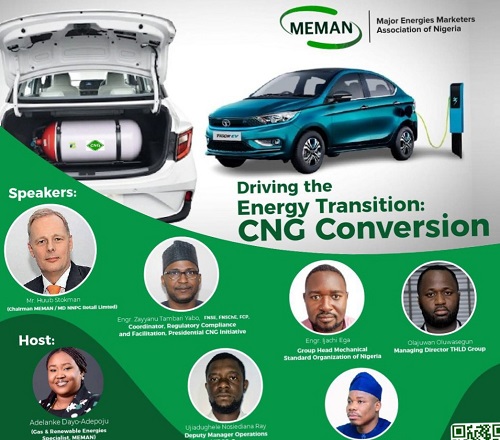…Stakeholders raise concern around Safety and Conversion Standards
Conversion of vehicles to Compressed Natural Gas (CNG) has been a burning issue since the inception of the administration of President Bola Tinubu owing to hike of Premium Motor Spirit (PMS) after removal of subsidy. There is plan that over the next 24 years, it is expected that the initiative will convert at least 1 million vehicles across Nigeria.
Speaking at the Major Energies Marketers Association of Nigeria (MEMAN), Competence Lecture Series Webinar titled “Driving the Energy Transition CNG Conversion” Engr. Zayyanu Tamban Yabo, Coordinator, Regulatory Compliance and Facilitation, Presidential CNG Initiative outlined the progress made so far. “Last year, when we started, only about 10,000 vehicles were converted over a span of 12 to 15 years,” Tamban Yabo said. “However, today, we have over 30,000 vehicles converted, and the target remains ambitious with plans to hit 1 million conversions by the end of the program.”
The initiative aims to ease Nigeria’s transportation sector’s transition to cleaner energy by focusing on commercial vehicles, which consume the most energy in the shortest time frames. Collaborating with transport unions and financial institutions, the government is offering support, incentives, and financing options to make the conversion process more accessible.
The official also noted the distribution of CNG-powered buses and tricycles as part of the effort. “As of September, we had distributed 20 buses out of the planned 100, and 200 tricycles out of the estimated 500. This is a nationwide program, and we are continuing deployments.”
The Nigeria Gas Infrastructure Fund (NGIF) is also playing a crucial role by helping establish the necessary refueling infrastructure for these converted vehicles, a critical component to ensure the project’s success. “This initiative is not just about reducing emissions but also about building a sustainable transport future for Nigeria,” Tamban Yabo emphasized.
The program’s stakeholders, including transportation unions, energy sector companies, and government agencies, have been commended for their contributions. However, challenges remain, including public awareness and readiness of the infrastructure, which will need to be addressed as the project progresses.
The nationwide shift to cleaner energy sources in transportation is expected to impact the economy positively while contributing to Nigeria’s environmental goals. The initiative highlights the government’s commitment to sustainability in the transportation sector.
Meanwhile, Olajuwan Oluwasegun, Managing Director of THLD Group, said that gas safety and conversion standards remain a concern. He explained that improper installations remain a significant risk, as evidenced by the recent explosion. “Even with a poorly installed system, if procedures are followed correctly, it can still function safely,” he said. He stressed that ensuring correct installation protocols is crucial to avoiding such accidents in the future.
Oluwasegun highlighted the growing concern over the rise of substandard and illegal installations, particularly those learned informally, such as through online tutorials. “It’s worrying that people can access step-by-step instructions on how to improperly install these systems online,” he remarked. The potential for dangerous outcomes when unauthorized components are used underscores the need for stringent regulations.
In response, he called for a comprehensive review of the CNG and LPG conversion processes, particularly for different vehicle types. He noted that for petrol engines, the conversion allows for switching between gas and petroleum, but for diesel engines, the process is more complex, requiring simultaneous injection of both fuel types. This technical distinction, he said, necessitates more targeted training and oversight.
Another major challenge in the industry is the verification of conversion work. According to Oluwasegun, while Nigeria’s National Automotive Design and Development Council (NADDC) has approved some conversion centers, there are still concerns about the level of expertise among installers. He explained, “One car cannot be a training tool for five or ten people. We need better training structures to ensure proper knowledge transfer.”
Meanwhile the issue of overcrowded refueling stations, particularly in Benin and Ogun states, where long queues of vehicles waiting for inspection have become a frequent occurrence. The experts called for improved traffic management and refueling infrastructure, emphasizing the need for a smoother workflow in refueling operations.
Technological advancements, such as the use of digital records for installation verification, were also proposed as part of the solution. “We need to find ways to synergize these processes,” they said, advocating for digital tracking systems that can authenticate installations done at approved centers. This would help regulators, including road safety officials; better manage the oversight of converted vehicles.
On the unfortunate incident that happened in Benin in a NIPCO CNG filling station, speaking at the Webinar, Deputy Manager Operations of NIPCO Gas, Ujiadughele Nosiediana Ray, noted that CNG focused legislation will deliver a vibrant and profitable stand-alone industry.
He said government will subsidised CNG and allocate it for all the companies promoting it for automobile sectors. There is a framework to be developed to provide licence to setup of CNG conversion centres.
Federal Government may allocate free land for establishing CNG facility with rigid system to be developed to create data bank with the details of the vehicles running on it.
Ujiadughele harped on educating and creating awareness to public on CNG and changing public perspective on CNG posing fear instead insist that genuine standard kits and cylinders for retrofitment.
The public should use CNG kits and cylinders from an authorised retrofitter to help install quality product.
He advised all customers to be patient and allow the filling attendant to check cylinder and kit to avoid any incidents.
The NIPCO Deputy Manager Operations posited that CNG as automobile fuel is the most econonical fuel available in the market and conversion packback can be received within three months.
He encouraged the public to be energy conscious in their homes and communities by promoting the use of cleaner fuels.
MEMAN made it known that the industry is growing and it is imperative that safety standards and knowledge transfer keep pace with technological advancements to avoid further accidents and inefficiencies which must be adhered.


Comment here